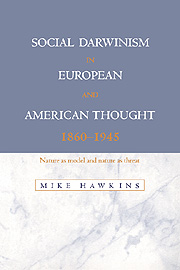Book contents
- Frontmatter
- Contents
- Acknowledgements
- Part I Defining Social Darwinism
- Introduction: the identity of Social Darwinism
- 1 Defining Social Darwinism
- 2 The distinctiveness of Social Darwinism
- Part II Pioneers
- Part III Case studies
- Postscript: Social Darwinism old and new: the case of sociobiology
- Bibliography
- Index
Introduction: the identity of Social Darwinism
Published online by Cambridge University Press: 07 December 2009
- Frontmatter
- Contents
- Acknowledgements
- Part I Defining Social Darwinism
- Introduction: the identity of Social Darwinism
- 1 Defining Social Darwinism
- 2 The distinctiveness of Social Darwinism
- Part II Pioneers
- Part III Case studies
- Postscript: Social Darwinism old and new: the case of sociobiology
- Bibliography
- Index
Summary
What is Social Darwinism, and what role has it played in the history of social and political ideas? These questions, the point of departure for the present study, are simple to formulate but, as the historiography of Social Darwinism attests, difficult to answer. Anyone consulting the vast literature on Social Darwinism in the hope of resolving them is likely to experience confusion rather than enlightenment. What he or she will encounter are heated controversies over a number of issues. First, scholars dispute the definition of Social Darwinism and, as a consequence, who is to count as a ‘genuine’ Social Darwinist. Second, they disagree over the ideological functions of Social Darwinism with some insisting on its conservative bias whereas others emphasise its reformist – even radical – orientation. Third, there is controversy over the significance of Social Darwinism, with positions ranging from the claim that it was both widespread and influential, to the contrary view that its importance has been grossly exaggerated by hostile commentators. Finally, scholars contest the relationship between Social Darwinism and Darwin himself, broadly dividing between those who see a connection and those who insist on a radical difference between the work of the English naturalist and the ideological uses to which his ideas were put.
This dissension has helped to define the aims and the contents of this book. Indeed, it is my view that any attempt to understand the emergence and history of Social Darwinism must first come to grips with these disputes: appreciating the points at issue and the controversies they have aroused is a first step towards a different approach to the subject.
- Type
- Chapter
- Information
- Social Darwinism in European and American Thought, 1860–1945Nature as Model and Nature as Threat, pp. 3 - 20Publisher: Cambridge University PressPrint publication year: 1997



